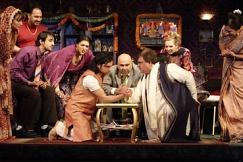Rafta, Rafta
Perhaps the most striking facet of this adaptation of Bill Naughton's 1963 play 'All in Good Time', has to be Tim Hatley's superb set design, which creates a visually impressive initial stir in the kind of manner that few other companies or venues could attempt. With a huge photograph of a northern terraced street painted or projected onto a gauze, the start of the show highlights a particular house which is first shown door-on and then proceeds to revolve around the huge Lyttleton stage to reveal the internal structure complete with bedrooms upstairs, and kitchen and lounge downstairs. Hatley then goes on to use the view from the 'street' to infer the passing of time by highlighting rooms in the house from the 'street' outside. It's a neat and effective technique which keeps the play flowing instead of stop-starting if there been interruptions for traditional scene changes. And what Hatley achieves is the real sense of being involved in the on-going daily lives of a family.
The story has its roots in the continuing post-war austerity of 60s Britain, where lack of funds and affordable homes meant that newly weds were often obliged to reside with in-laws whilst they struggled to save the nest-egg to afford a place of their own. With ever-spiralling house prices, maybe the practice will become widespread once again, though the number of marriages is on the slippery slope of decline, as it has been for some time.
It's the wedding day of the eldest son of the Dutt family who reside in a typical terrace street in Bolton, Lancs. We join the Dutt family in their home after the formalities of the wedding ceremony are over, and the family, in-laws and friends are relaxing with drinks, songs and the all-important arm-wresting match. Father of the house, Eeshwar Dutt, reasserts his dominance of the household by beating his newly-married son - more by deception than sheer physical strength. And this is where the problems begin, because for son Atul, this isn't the environment in which to seal his marriage knot, so to speak, and the tension mounts as the marriage remains unconsummated after several tortuous weeks.
Believability and realism figure among the fine qualities on display from director Nicholas Hytner's cast, who seemed to be actually living their roles, rather than just playing them. There were several moments when it was actually quite hard to know if one was watching a fly-on-the-wall documentary, or stage play, particularly with some recognisably authentic business such as when Eeshwar puts pickle on his food, then dives for water when he finds it too hot - only to add more spice when his wife criticises him.
The best role in this piece has to be that of mum Lopa Dutt, excellently played here by Meera Syal, whose stalwart sensitivity and astute motherly concern for her son demonstrates the real 'power' within the family, and the source of its strength. But Syal also gives us a tolerant, humorously generous woman who we sense could have been and done much more given the appropriate life opportunities.
On the other hand, Harish Patel provides an irresistibly jovial and entertaining father, Eeshwar, who is not only slow to latch on to the problem his son is experiencing, but equally slow to comprehend how to communicate with him. Though Eeshwar is in many ways a stereotypical character, there's more to him than first meets the eye as begin to comprehend when we learn about the unusual circumstances surrounding his own honeymoon. But in the end, it's in Eeshwar that we discover true friendship, and unashamed emotion and humanity, prompted by a heart-felt desire to share the happiness and joys which life can provide.
Ronny Jhutti simmers with frustration and angst as the groom who can't 'rise to the occasion', and is well-supported by a subtly vivacious and equally frustrated Rokhsaneh Ghawam-Shahidi as his new bride. And there's strong, well-directed support from the rest of the cast too.
Naughton's play was made into a film ('The Family Way') in 1966 with child-star, Hayley Mills in her first 'grown up' role, playing opposite her father, the famous British actor, John Mills. It proved to be controversial because of a glimpse of Hayley Mills' naked flesh, and proved to be more of a 'growing up' role than Hayley Mills might have imagined since she fell for her 50-something director, marrying him some six years' later. Nothing like keeping it all in the family it seems!
It would be wrong to assume that 'Rafta, Rafta' is a simple, rehashed homage to Naughton's work by Khan-Din and Hytner. There's far more to it than that, because both writer and director have recognised the virtues of the original, whilst forcefully, if not indelibly, stamping their own marks on its themes. Part comedy, part insight into the condition and structure of the modern family, this revival-cum-adaptation leaves you with an irresistibly warm glow at its conclusion. That might sound soppy, but it's certainly great theatre.
(Peter Brown)
What the critics had to say.....
NICHOLAS DE JONGH for THE EVENING STANDARD says, "Amusing." MICHAEL BILLINGTON for THE GUARDIAN says, "The play has all the virtues, and a few of the vices, of popular comedy. It makes one laugh out loud but at the same time resolves matters a shade easily." CHARLES SPENCER for THE DAILY TELEGRAPH says, "Superb piece of popular theatre that has you laughing uproariously at one moment and surprised by tears the next." BENEDICT NIGHTINGALE for THE TIMES says, "Enjoyable."
External links to full reviews from popular press
The Guardian
Daily Telegraph
The Times
Production photos by Catherine Ashmore
Originally published on
